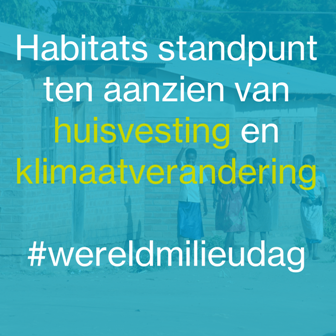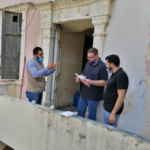Habitats standpunt ten aanzien van huisvesting en klimaatverandering
Vandaag op wereldmilieudag delen wij graag ons standpunt ten aanzien van huisvesting en klimaatverandering. Bij Habitat zien wij steeds vaker de schrijnende gevolgen van klimaatverandering. De families met wie wij werken in ontwikkelingslanden zijn degenen die het hardst geraakt worden door de extreme weersomstandigheden – van orkanen en overstromingen tot bosbranden en droogte – die het gevolg zijn van klimaatverandering. Zij verliezen niet alleen hun schamele onderkomen bij zo’n ramp, maar worden ook extra kwetsbaarder voor ziekte, honger en sociale uitstoting. Een neerwaartse spiraal die wij in de praktijk helaas vaak tegenkomen en waar wij met onze projecten tegen strijden.
Tegelijkertijd weten wij – als wereldwijde huizenbouwer – hoe vervuilend de bouwsector nu nog is. Waar ‘duurzaam’ in Nederland meer en meer de norm wordt, is dat het in veel landen nog lang niet zover. Als Habitat nemen wij onze verantwoordelijkheid. Niet alleen bouwen wij in onze projecten met respect voor mens en milieu, maar daarnaast zetten wij ons ook in om duurzame bouwmaterialen en milieuvriendelijk bouwen in meer landen en voor mensen met minder inkomen toegankelijk te maken.
Lees hier meer over Habitats standpunt ten aanzien van huisvesting en klimaatverandering >>
Een aantal voorbeelden van klimaatvriendelijke Habitatprojecten
- The REELIH (Residential Energy Efficiency in Low-Income Households) project, supported by the U.S. Agency for International Development, or USAID, greatly improved energy efficiency in apartment complexes of Central and Eastern Europe. Habitat is now working to scale up those improvements in the region. Read more >>
- With support from the Hilti Foundation, Habitat is working in Nepal and the Philippines to build disaster-resilient and environmentally friendly bamboo homes. Read more >>
- Habitat’s Terwilliger Center for Innovation in Shelter supports Burn, a Kenya-based startup that provides clean cook stoves, helping reduce the need for charcoal and, as a result, deforestation. Watch on YouTube >>
- The Terwilliger Center’s ShelterTech platform has supported a number of environmentally friendly startups, including one that upcycles plastic for construction materials, another that build skills for constructing a zero-carbon-footprint home, and a company that relies on biomimicry to treat waste water without power. Read more about Habitats Terwilliger Center >>
- Habitat for Humanity Sri Lanka, under the “Homes not Houses” project funded by the European Union, has led construction of more than 1,000 homes with eco-friendly construction materials, including compressed stabilized earth blocks. The compressed blocks are made of locally sourced materials and provide an alternative to mining sand, lowering the construction’s carbon footprint. The blocks’ thermal properties also make them energy efficient. Habitat is now working with local partners to expand the use of this earth-friendly construction product in the Sri Lankan mark Read more >>



